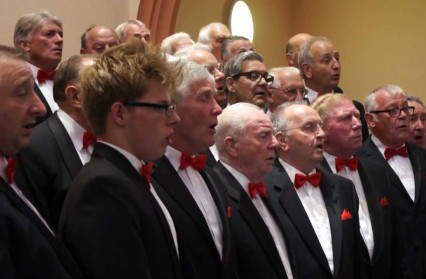As a teacher in Wales I often find myself asking pupils to define Welshness. The task is, of course, impossible and that’s what I want them to see at the end of the process; Welsh identity is intangible and cannot be summarised in a neat definition. Often though, when asked to come up with some images and symbols of Welshness, along with inevitable sheep or leeks, pupils will suggest singing. Singing undeniably plays a massive role of our country’s identity. As Dylan Thomas’ Reverend Jenkins exclaims on overhearing Polly Garter singing whilst scrubbing the steps of the Welfare Hall, “Thank God, we are a musical nation.” I doubt that anyone can offer a concise reason why Wales is intrinsically linked to this idea of musical expression, but Focus Films’ new documentary exploring the future of the tradition of Male Voice Choirs attempts to offer some context and investigate this enduring bond between Wales and singing.
Following Blaenavon Male Voice Choir, producer and co-director Daniel Harris says he has been working with Blaenavon in order to try and help them move forward in an increasingly digital age. What was originally meant to be a ten minute documentary has grown into something much larger. The film follows the choir’s struggle to recruit new and younger members in a world which is becoming ever more digital. The importance of social media may be lost on the older members, but what they have to offer is much more valuable; a traditional sense of community, a choir which represents the social fabric of the old Welsh industrial valleys.
The film aims to break down the stereotype of a choir which is over a hundred years old. The choir want to branch out and are keen to engage with the younger members of the community. Daniel and the team have been educating the choir in social media, encouraging them to utilise these more relevant means of communication. This struggle will undoubtedly resonate with other Male Welsh Voice Choirs who want to achieve the same objective. Welsh people may be proud of our singing culture, but are they aware of the struggles that occur behind the scenes? We take for granted something which we also consider a vital image of our identity. Will these Welsh choirs still exist in a hundred years’ time?
The film not only explores this struggle to adapt, but also the story of the choir and its characters. On meeting the choir members, Daniel and the team felt that there was potential for an even more engaging story. The film follows a new member and his integration into the choir in an attempt to show people that these choirs are friendly, open places. The men recognise that some older males may feel nervous about joining a choir, so the film will demonstrate how smooth this integration process is. It also follows the process of learning the songs, again in an attempt to remove any pre conceptions and encourage people to join.
Ultimately of course, there is a gap in age throughout all choirs in Wales. Younger people may join choirs in school or University, but then there’s a gap of around 20 years due to what one may assume to be ‘career years’ until the commitment picks up again at around 40. It’s incredibly important to sustain these organic choirs, to support them by all means necessary, and whilst the film cannot offer any solid solutions, it does offer ways of working and moving forward. With the support of CADW, the film will premier in the new Premiere Cinema in Cardiff in October. What originally began as a ten minute music video and documentary has evolved into something a lot more engaging and provocative. What is the future for our Welsh choirs?
Help out with the Focus Films documentary by donating to their cause here.












